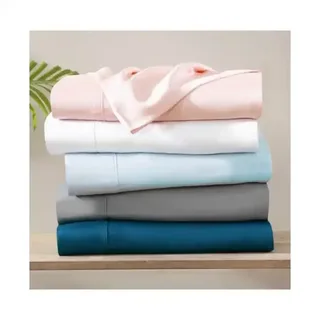Small fashion brands face unique challenges when sourcing materials. Finding quality linen fabric by the yard at competitive prices can make or break your budget. Atlanta’s textile scene offers several opportunities for brands looking to secure bulk linen supplies.
This guide walks you through local suppliers, online marketplaces, and proven strategies that help small brands source linen efficiently. You’ll learn how to negotiate better deals, avoid common pitfalls, and find suppliers that match your brand’s needs and budget.
Why Linen Works for Small Brands
Linen fabric by the yard offers several advantages that make it attractive for emerging fashion brands. The fabric’s natural durability means your customers get longer-lasting garments, which builds brand loyalty and reduces returns.
Sustainability matters more to consumers now than ever before. Linen comes from flax plants, which require less water and chemicals than cotton. This eco-friendly aspect helps small brands position themselves as responsible choices in a crowded market.
The fabric’s versatility allows brands to create everything from casual summer pieces to structured business wear. Linen’s breathability makes it perfect for Atlanta’s humid climate, giving local brands a natural selling point.
Price stability is another benefit. Unlike synthetic fabrics that fluctuate with oil prices, linen maintains relatively steady pricing. This predictability helps small brands plan their budgets and pricing strategies more effectively.
Local Atlanta Suppliers for Bulk Linen
Atlanta’s textile district houses several suppliers that cater to small brands. These local options offer the advantage of seeing fabrics in person and building face-to-face relationships with suppliers.
Mood Fabrics Atlanta stocks a wide selection of linen fabric by the yard. They offer competitive pricing for bulk orders and maintain consistent inventory levels. Their knowledgeable staff can help match fabric weights to your specific needs.
Atlanta Wholesale Fabric specializes in working with small brands and startups. They offer flexible minimum order quantities and provide samples before large purchases. Their warehouse location makes pickup convenient for Atlanta-based brands.
Southern Textile Supply focuses on natural fibers and maintains strong relationships with linen mills. They offer seasonal buying programs that help small brands secure better pricing through group orders.
These suppliers often provide additional services like fabric inspection, custom cutting, and warehousing. Building relationships with local suppliers can lead to better terms, priority access to new fabrics, and valuable industry insights.
Online Marketplaces for Linen Fabric
Online platforms expand your sourcing options beyond Atlanta’s borders. Fabriclore stands out as one of the best online stores for quality linen fabric by the yard. They offer competitive bulk pricing, detailed fabric specifications, and reliable shipping to Atlanta.
Fabric Wholesale Direct provides extensive linen selections with clear minimum order requirements. Their online catalog includes detailed photos and fabric specifications that help you make informed decisions without physical samples.
B&J Fabrics operates both online and through their physical locations. They offer bulk discounts starting at relatively low quantities, making them accessible for smaller brands just starting out.
Mood Fabrics Online extends their physical store inventory to online shoppers. They provide detailed fabric information and offer swatching services for bulk orders.
Online sourcing requires more careful planning since you can’t physically inspect fabrics before ordering. Request samples when possible, and start with smaller test orders to verify quality and consistency.
Key Factors to Consider When Sourcing
Minimum Order Quantities (MOQs) vary significantly between suppliers. Some local Atlanta suppliers work with orders as small as 50 yards, while others require 500+ yards. Online suppliers like Fabriclore often offer more flexible MOQs that work better for small brands.
Quality consistency matters more than the lowest price. Request fabric specifications including weight, thread count, and shrinkage rates. Establish quality standards and communicate them clearly to suppliers.
Shipping costs and timing can impact your total fabric cost significantly. Local suppliers eliminate shipping costs but may have higher base prices. Online suppliers might offer bulk shipping discounts that offset their distance disadvantage.
Payment terms affect your cash flow management. Many suppliers offer net 30 terms for established customers, while new relationships typically require payment upfront or COD.
Color matching becomes critical when ordering linen fabric by the yard from multiple suppliers. Establish color standards using Pantone codes or physical samples to ensure consistency across orders.
Smart Negotiation Strategies
Small brands often assume they lack negotiating power, but several strategies can help secure better deals on linen fabric by the yard.
Order consolidation gives you more leverage. Plan your fabric needs for entire seasons rather than placing frequent small orders. Suppliers prefer fewer, larger orders that reduce their administrative costs.
Flexible timing can unlock discounts. Ask suppliers about their slow periods and seasonal price variations. Ordering during off-peak times often results in better pricing.
Long-term commitments interest suppliers more than one-time purchases. Express your growth plans and future fabric needs. Suppliers often offer better terms to customers who demonstrate staying power.
Cash payments sometimes earn additional discounts, especially with smaller suppliers who value immediate payment over extended terms.
Group buying with other small brands can help reach higher volume thresholds. Atlanta’s fashion community includes several informal buying groups that pool orders for better pricing.
Case Study: Local Brand Success Story
Peach State Apparel, an Atlanta-based sustainable fashion brand, demonstrates effective linen sourcing strategies. Founder Sarah Mitchell started with small orders from local suppliers to test designs and customer response.
After validating her initial product line, Mitchell negotiated annual contracts with two suppliers: a local Atlanta supplier for quick restocks and Fabriclore for seasonal bulk orders. This dual-supplier approach balanced cost savings with operational flexibility.
Mitchell’s key success factors included maintaining detailed fabric specifications, establishing quality inspection processes, and building strong supplier relationships. Her brand now processes over 2,000 yards of linen annually while maintaining healthy profit margins.
The brand’s growth from 50-yard initial orders to current volumes demonstrates how small brands can scale their sourcing operations. Mitchell emphasizes that starting small but thinking strategically about supplier relationships makes the biggest difference.
Building Your Linen Sourcing Strategy
Start by calculating your actual fabric needs based on production plans and sales forecasts. Overestimating leads to cash flow problems, while underestimating creates stockouts and lost sales.
Create a supplier evaluation matrix that weighs factors like price, quality, reliability, and service. Don’t choose suppliers based solely on lowest prices – consider total cost of ownership including shipping, handling, and potential quality issues.
Maintain relationships with multiple suppliers to reduce risk. Having backup options protects against supply disruptions and provides negotiating leverage with your primary suppliers.
Document everything from quality standards to delivery terms. Clear agreements prevent misunderstandings and provide recourse when issues arise.
Plan seasonal buying cycles that align with fashion calendars and supplier capabilities. Most linen suppliers offer their best pricing during specific periods that correspond with mill production schedules.
Fabriclore is a leading B2B fabric sourcing platform dedicated to empowering fashion designers, apparel manufacturers, and clothing brands worldwide. With 10+ years of experience in the textile industry, we have built a trusted network that connects creativity with high-quality fabrics, ensuring seamless and efficient sourcing for every scale of production.
Our extensive collection includes natural fibers like cotton fabric, linen fabric, and silk fabric; man-made fibers such as viscose and polyester; along with sustainable options like LENZING™, LIVA™, BEMBERG™ Cupro, and organic cotton.
We offer four key services tailored to meet every design and production need:
- Dyeable Fabric – Woven RFD & greige, sustainable, and knitted fabrics.
- Dyed Fabric – Mill dyed, yarn dyed, Schiffli, and denim fabrics.
- Made To Order – Digital printing, screen printing, block printing, and dyeing solutions.
- Ready Stock – Block, screen, Ikat, tweed, and jacquard fabrics.
Explore our diverse range of custom-printed, ready mill-dyed, and yarn-dyed fabrics to find the perfect match for your next collection.
For personalized assistance or inquiries, reach out to us at [email protected].
Experience seamless, authentic, and affordable fabric sourcing with Fabriclore — your trusted partner with over a decade of expertise in the global textile industry.


